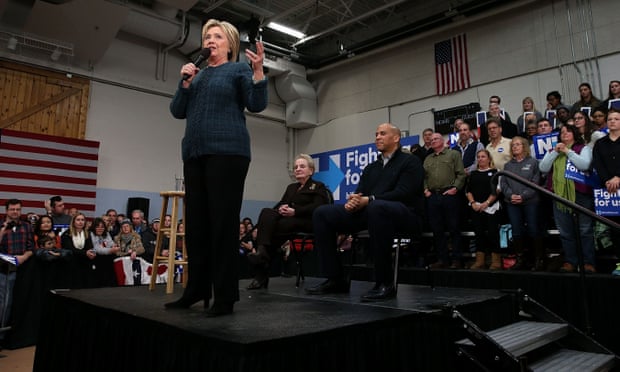Can Sanders win the black Democratic vote? He’s got a long way to go -- by Syreeta McFadden
‘His campaign, in some ways, taps into the desire for an alternative to Clinton that voters sought in 2008.’ Bernie Sanders with Dr Cornel West in South Carolina in September 2015. Photograph: Richard Ellis/Zuma Press/Corbis
It took a long time for Barack Obama to woo African American voters, who were decidedly in the Hillary Clinton camp in the early weeks of the 2008 race for the Democratic nomination. The tide shifted after Obama won the Iowa caucuses, proving himself to be a viable candidate. Clinton’s strong black support began to ebb after a series of flippant remarks from Clinton herself and her biggest asset and liability, former president Bill Clinton, in advance of the primary in South Carolina – a state with a large black Democratic base – in late January.
Many voters were outraged by the Clintons’ disparaging language towards Obama, and shifted their support to him – paving the way for his eventual historic win.
Bernie Sanders’ campaign, in some ways, taps into the desire for an alternative to Clinton that voters sought in 2008. And yet African Americans, the strongest, most consistent voting block, haven’t abandoned Clinton this time; many are unfamiliar or uncomfortable with the socialist democratic values Sanders proposes to bring to the White House. Clinton still holds many crucial endorsements from elected officials, unions, activist groups and black clergy. She now frequently invokes Obama in her remarks, a key signal to voters that she intends to be heir to his legacy.
But Erica Garner – the daughter of Eric Garner, who was killed by a New York City police officer in 2014 in a banned chokehold for allegedly selling loose cigarettes – has endorsed Bernie Sanders. In an opinion article she posed a series of questions that articulated Sanders’ platform: “Who understands that we’re experiencing an economic crisis made worse by structural barriers to jobs and education? Who will bring us closer to real safety, freedom and power? Who has clearly shown us where they stand?”
The Sanders camp, however, appears to have only recently taken this relationship seriously, employing surrogates such as former Ohio state senator Nina Turner, scholar and Obama critic Cornel West and hip-hop artist Killer Mike, in an attempt to connect with black voters who are angry, alienated and outside the black Democratic establishment or disappointed with Obama’s record.
It is a strategy that should have been employed months ago. Sanders is a true believer in that he simply thinks people will support him without actually courting voters. In the earlier days of his campaign, rallies that swelled to 20,000 were homogeneous, dominated by blue-collar white Americans. The turning point for Sanders among many African Americans was when the candidate fluffed his response to a Black Lives Matter protest at his rally in Seattle last August, an incident that outraged his supporters.
Yet that incident only underscored a fraught history between the black community and the white left. The white left in America has often asked black America to subordinate the fight against racism for a collective struggle against class divisions. That demand ignores the fact that racism overlays and complicates every aspect of American life.
In addition, to some young black voters, Sanders’ answer to the question of reparations for the descendants of slavery had been disappointingly lacklustre, again showing a misunderstanding of how race and class intersect.
For others, Sanders’ words sound like idealism that isn’t rooted in a tangible plan. Job creation, single-payer healthcare and free college are great ideas but would require huge political capital to become reality. To the black Democratic establishment, Clinton seems more plausible.
If anything, these candidates highlight a generational divide within the African American community on how to address our issues. The older generation is pragmatic, and used to making slow progress towards equal rights and the promise of the American democracy. The younger generation is cynical yet optimistic, and knowledgeable, understanding the failures of the old methods that have not made significant gains for African Americans since the 1960s civil rights movement.
The work of those black baby boomers has been slowly undone, even though some have moved into establishment positions. Decades after the end of official segregation, and after gaining the right to vote, African Americans are faced with a weakened and depleted middle class, many of whom suffered great losses from the last financial crisis and depression. And some of the baby boomers’ gains, such as protections within the Voting Rights Act, are even being rolled back.
Hillary Clinton’s roots with the black American Democratic establishment are deep – the relationship stretches back decades with the congressional black caucus and by extension, black clergy.
Given the track record of the last Clinton presidency, and its ties to embattled Chicago mayor Rahm Emmanuel – whose police department faces a multitude of high-profile complaints over abuses – her recent endorsements from mothers who lost loved ones to police and vigilante violence remain curious. But Sanders has many miles to go to convince black voters that he can fight for our interests and deliver. We’ll know more about whether he can break through after the South Carolina primary at the end of this month.



Comments